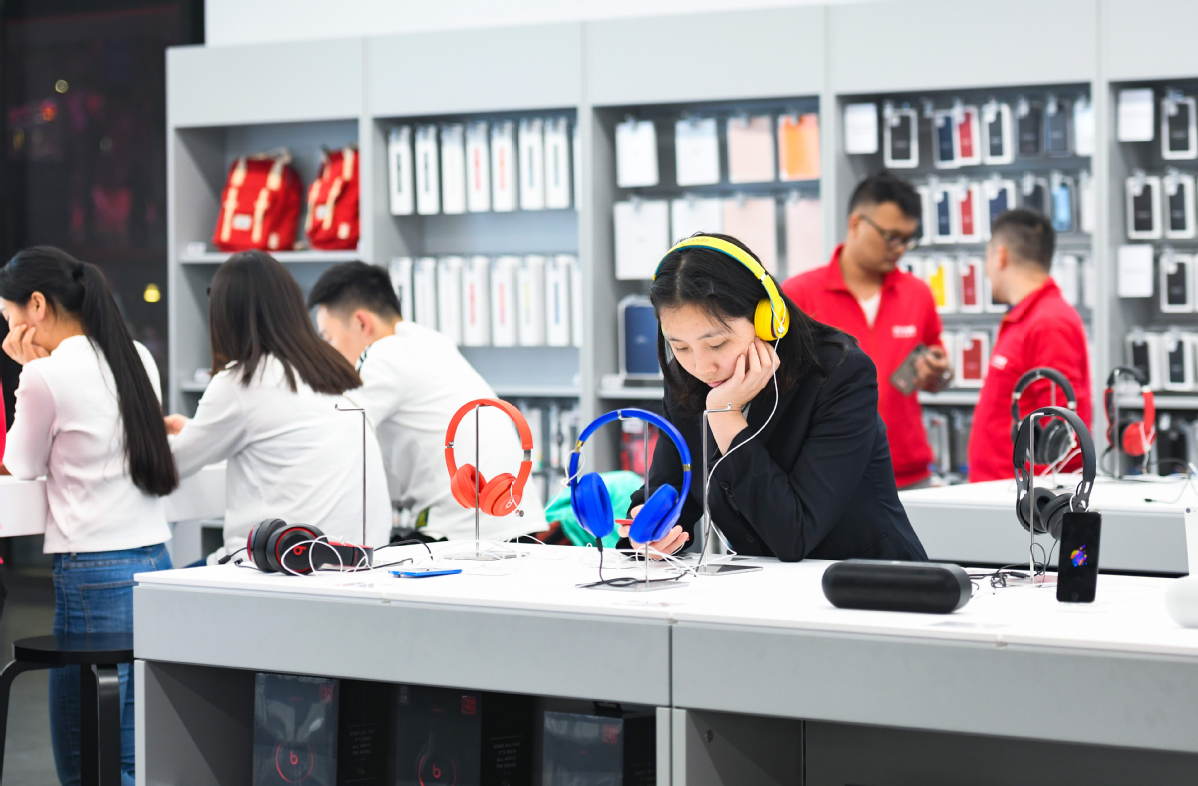Chinese online retailers scramble to open more physical stores


Chinese online retailers are gearing up to open brick-and-mortar stores and offer immersive, interactive and intelligent shopping experiences for consumers, hoping to cash in on the growing demand arising from consumption upgrade and the rise of middle and high-income Chinese shoppers, said industry experts.
E-commerce giant JD opened its largest offline store named "JD e-space", spanning 50,000 square meters in Chongqing on Nov 11, as part of its boundaryless retail strategy that aims to promote online-to-offline retail experiences for customers.
The store features popular and bestselling offerings in product categories from electronics, home appliances, digital accessories to health, fitness and beauty products and office supplies.
JD claimed the e-space will be the country's only major store to offer ultrafast 5G network coverage. It has dynamic price tags to ensure store prices are aligned with online prices, and robots to guide customers and introduce products.
After experimenting with these products, consumers can scan a quick response code to buy and have items delivered to their homes by JD Logistics, the logistics arm of JD, usually within 24 hours or they can complete their purchase on-site and carry home in-stock products immediately.
More than 30,000 customers had visited the store as of 12 am on Nov 11, with sales revenue surpassing 10 million yuan ($1.4 million) within an hour of the store opening, according to JD.
"JD's boundaryless retail strategy is to integrate online and offline retail, enabling customers to buy whatever they want, whenever they want, wherever they want," said Yang Zisheng, head of offline business at JD Home Appliances.
Yang said with the most advanced technologies and state-of-the-art products, the offline store provides consumers not only shopping convenience but also an immersive and interactive experience.
To further enhance the shopping experience, the store also has various themed experience areas, such as Apple's largest authorized offline experience store, Microsoft's first smart home experience area in China, GE's first omnichannel home appliance store in China, and Ninebot's first authorized offline experience store in China.
Vipshop Holdings Ltd, China's major online discount retailer, has already opened about 300 brickand-mortar stores across the nation.
In July, it purchased brick-and-mortar outlet operator Shanshan Group for 2.9 billion yuan, which represents another milestone in Vipshop's efforts to explore online and offline integration in its core business.
"Through this highly strategic transaction, we will gain presence in the offline outlet business in China, which further enhances our ecosystem and fortifies our leading position in China's discount retail segment," said Eric Shen, chairman and CEO of Vipshop.
Shanshan currently operates five outlets in Ningbo, Taiyuan, Harbin, Zhengzhou, and Nanchang, with another five outlets in the pipeline.
The company said net revenue for the third quarter of 2019 rose 10 percent year-on-year to 19.6 billion yuan, compared with 17.8 billion yuan for the same period a year ago. Its net profit stood at 1.2 billion yuan, an increase of 140.2 percent year-on-year from 500.8 million yuan in the same period a year earlier.
Chen Tao, an analyst with internet consultancy Analysys in Beijing, said the offline stores could play a complementary role in boosting sales of online retailers and help in cultivating purchase habits of consumers.
"By virtue of big data and artificial intelligence, the offline stores could better capture consumers' shopping habits and preferences, and make accurate recommendations," Chen noted.
Yitiao, a video-focused content producer and e-commerce startup, opened its first three brick-and-mortar stores in Shanghai last year. Xu Husheng, founder of Yitiao, said the company plans to open 100 offline channels in the next two years.
Mo Daiqing, an analyst at the China E-Commerce Research Center, said the offline stores will present a new opportunity for major online retailers to expand their retail channels.
"First of all, the targeted customer group should be determined, and the portfolio of products should be differentiated so as to bring about new shopping experiences. Second, online retailers must do well in supply chain management, balance the online and offline prices of products, as well as consider cost structure to gain profits," Mo said.




































